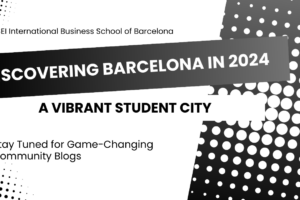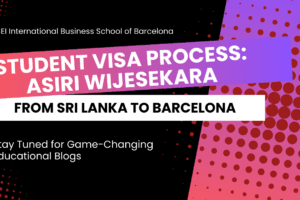
Meet the winner of the Leadership in Business Scholarship!

Supporting our students and encouraging their entrepreneurial efforts is very important to us here at ESEI. As a way of backing the young entrepreneurs who arrive at our school with the desire to expand their knowledge and use it to succeed in the business world, we have created a scholarship that can help them chase their dreams.
The Leadership in Business Scholarship recognizes the entrepreneurial journey of students who have started their own ventures. Each year, it is awarded to someone who can demonstrate the valuable professional experience they have gained in a business context.
Their reward is a 10% discount from the course tuition fee.
This year, the winner of the Leadership in Business Scholarship is Robin Held, whose application demonstrates the work that he’s done as CEO and Co-Founder of Squarrel, a Munich-based startup that functions as an Airbnb for storage spaces.
Robin and his team took the popular concept of the sharing economy and created a peer-to-peer marketplace where users can find or rent out unused storage spaces such as garages, attics, basements or even empty rooms. As a Co-Founder, Robin is responsible for team management, product delivery, the company’s go-to-market strategy as well as business planning and investor relations.
We had a chat with Robin about how he came up with the idea of monetizing idle storage spaces and what he learned from starting his first venture.
What gave you the idea for Squarrel? Was it a personal experience that inspired the business idea?
As someone who comes from the mountains in Germany, I have always loved skiing. When I graduated from University in 2015, I decided to move to Canada for a year. I spent 6 months in Whistler and then moved to Vancouver. Not having a place to store my skis, I made an arrangement with my co-worker that he’d store them for me in exchange for a six-pack of beer every month. That was the moment I realised that there had to be a business opportunity in helping people to store their things locally in their neighbourhood. Then and there I knew we had to launch an Airbnb for storage. When I came home, I told my brother about the idea and we started working out the concept.
Have you always wanted to be an entrepreneur?
Absolutely, yes! I never liked the whole “hierarchy” concept and usually thought I could do a better job than my managers. I also found that working for somebody else makes you too comfortable and before you realise, five years have passed. I found that having my own business slows down time and makes life a lot more interesting.
When did it first occur to you that you’d like to start your own company?
I always knew that I wanted to have my own company eventually. At every job I took, I was never challenged. I have too much energy not to start my own company.
What was the most important thing you learned from starting your first venture?
I learned a lot, but a few things surprised me in particular.
- Adults are as unpunctual and messy, just like young people.
- I learned that always having a positive outlook is imperative: this makes anything possible. No bureaucracy can stop you from doing what you want to achieve if you are persistent enough. I also learned that even if you sometimes don’t have the expertise to solve certain issues immediately, there is is no excuse in the world not to figure it out somehow. I was amazed by how helpful most people are in sharing their knowledge with us. Last but not least, I want to mention my dear friend Google, who would never disappoint me when asking about how to get things done. If nothing else, I learned the value and skills behind self-directed research.
Would you launch another startup within the sharing economy/marketplace sphere in the future?
Marketplaces are evil. Not only do you have to solve the chicken or the egg problem*, but there are a lot of other hazards on the way. I will be back, that is for sure, but I don’t think it will be another marketplace.
*Ed note: this refers to the issue of needing to find suppliers in a market place at the same time as buyers; no buyers and the suppliers are not interested. Conversely, if there’s no supply, the buyers are not interested. See: The Chicken and Egg Problem of Peer-to-Peer Marketplaces: Who to Attract First?
What do you expect from the programme at ESEI? And how are you planning to use what you learn?
I need inspiration and knowledge! That is why I am moving to Barcelona and that is why I am studying at ESEI. I also really like the schedule, which allows me to work during the daytime. I am really looking forward to studying at ESEI and cannot wait to meet all of you guys.



